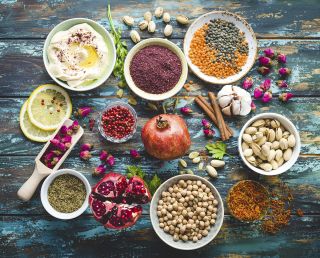Gut-Brain Axis
How the Psychobiotic Diet Can Reduce Stress
Coping well with stress is partly due to our diet.
Posted August 21, 2024 Reviewed by Lybi Ma
Key points
- A psychobiotic diet is similar to a Mediterranean diet with lots of fiber and ferments.
- The variety in such a diet improves the diversity of microbes in the gut.
- A diverse microbiome is stabler and helps to lower inflammation, protecting against stress.
“It’s not stress that kills us; it is our reaction to it.” —Hans Selye
The word psychobiotic has a slightly sinister sound to it, but the psychobiotic diet does not come from Hannibal Lecter’s recipe book. The word psychobiotic actually refers to microbes that can improve our mental health, and the diet is designed to boost those microbes. Based on research from the remarkably productive lab of John Cryan and Ted Dinan, this is a modified Mediterranean diet, heavy on fiber and ferments. These nutrients boost the growth of psychobiotic microbes that produce substances that heal the gut and soothe the brain.

Full disclosure, I wrote a book with Cryan and Dinan called The Psychobiotic Revolution, where we covered many of the components of a healthy diet full of fiber and ferments. The book goes into much more detail than I can cover here, but there are some important new concepts in their recent study titled Feed your microbes to deal with stress.
Since our book came out, Cryan and Dinan have expanded the definition of psychobiotics to include not just microbes, but also prebiotics, ferments, and other foods that increase the diversity and stability of the microbiome. Now they are proposing that our diet can be psychobiotic as well. Ted Dinan coined the term psychobiotic in 2013; he gets naming rights.
Their study split 45 adults into two groups: one group getting psychobiotics and the other group acting as a control. The people getting the psychobiotic diet had a 15 percent reduction in perceived stress over the control group. Notably, the people who adhered better to the diet had better results. That kind of dose-response curve (the higher the dose, the better the response) is a good sign that the effect is causal. The researchers concur, writing that “dietary approaches can be used to reduce perceived stress.” It’s not a huge effect, but in today’s stressful environment, any improvement at all can be a blessing.
How does this work?
The gut-brain axis is becoming more familiar to people, and Cryan and Dinan bear a lot of responsibility for getting the word out. Their research shows that the brain has an impact on the microbiome and vice-versa.
Fiber has a big impact on our microbiome, but people who mainly consume processed food miss out on this important nutrient. Fiber isn’t for us, but our microbes, which devour it and in turn produce substances like butyrate that act as a balm for the gut lining—and can have beneficial effects on the brain as well. The Standard American Diet (SAD—a perfect acronym) starves our good gut microbes and leads to an unstable and less diverse microbiome.
Ferments add living probiotics to the mix. Although most probiotics don’t take up permanent residence in the gut, they do a world of good as they pass through. Probiotic bacteria that lower the pH discourage the growth of pathogenic microbes and encourage the beneficial ones. A healthy microbiome is less likely to leak, which can allow microbes and their toxins to enter the bloodstream. If we persist in a bad diet, we can develop chronic inflammation, which can lead to numerous diseases and lower our resilience to stress.
The upshot is that a quality diet including fiber and ferments is linked to a reduction of many common mental illnesses.
What is the psychobiotic diet?
Given that a diverse microbiome is healthier and more stable, what kind of foods should we eat? Unsurprisingly, a diverse set of foods is required to support a diverse microbiome. Each species of microbe has its own favorite food, and we therefore need to eat a lot of different kinds of fiber to satisfy their tastes. A good psychobiotic diet is therefore similar to a Mediterranean diet, which is characterized by a wide variety of fiber-filled veggies (garlic, leeks, cabbage, artichokes, onions), fruits (berries, figs, avocados), nuts (pistachios, almonds), grains (oats, bulgur, farro), legumes (beans, lentils), good fats (omega-3, olive oil), seafood (salmon, shrimp), spices (oregano, basil, cinnamon, cumin, fennel), greens (arugula, spinach), and ferments (yogurt, kefir, cheese). It is also low in sugar.
Some scientists are recommending that we eat 30 different vegetables a week, which is concerning to those of us who only know of five vegetables, to begin with—and the only ones we eat are potatoes and onions. The other three vegetables that we know about, we avoid. This is why we have gut problems, excess weight, and mental health issues. Are people living on the Mediterranean diet healthier and happier than us? Generally speaking, yes.
If you just can’t see your way to eating 30 veggies a week, you might try prebiotics. Prebiotics are fiber, food for your good microbes. Go for a blended prebiotic, since you want to boost diversity. Americans only get about 10 grams of fiber a day, but 35 to 50 grams is recommended.
If we want to boost our resilience to the crazy stressors that plague us, we could do worse than the psychobiotic diet. Maybe with some fava beans and a nice chianti.
References
Berding, Kirsten, Thomaz F. S. Bastiaanssen, Gerard M. Moloney, Gerard Clarke, Timothy G. Dinan, and John F. Cryan. “Adherence to a Psychobiotic Diet Stabilizes the Microbiome and Reduces Perceived Stress: Plenty of Food for Thought.” Molecular Psychiatry, July 17, 2024, 1–2.
Berding, Kirsten, Thomaz F. S. Bastiaanssen, Gerard M. Moloney, Serena Boscaini, Conall R. Strain, Andrea Anesi, Caitriona Long-Smith, et al. “Feed Your Microbes to Deal with Stress: A Psychobiotic Diet Impacts Microbial Stability and Perceived Stress in a Healthy Adult Population.” Molecular Psychiatry 28, no. 2 (February 2023): 601–10.
Dinan, Timothy G., Catherine Stanton, and John F. Cryan. “Psychobiotics: A Novel Class of Psychotropic.” Biological Psychiatry 74, no. 10 (November 15, 2013): 720–26.


